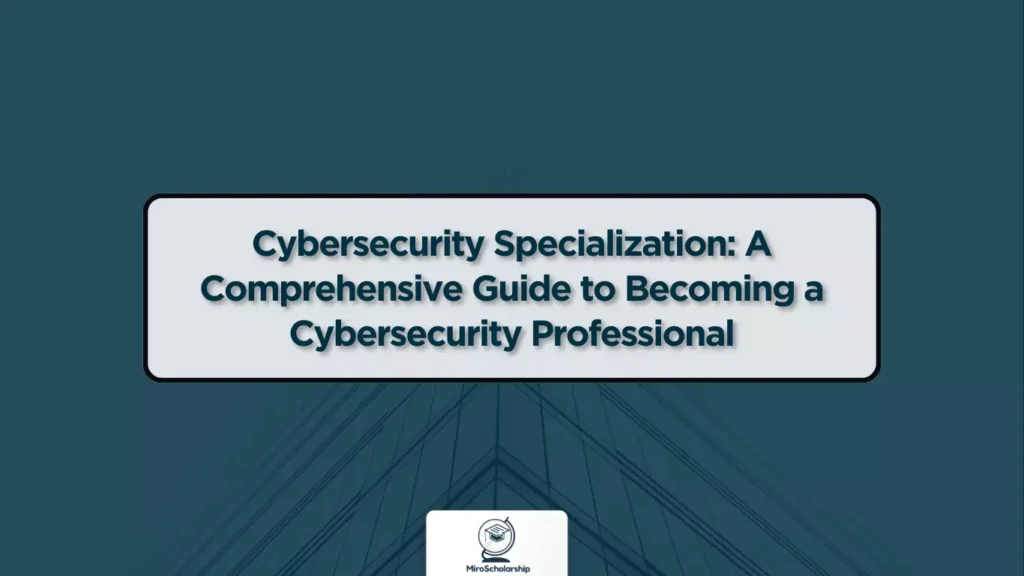Introduction
In today’s increasingly digital world, cybersecurity has become one of the most crucial fields for protecting sensitive data, maintaining privacy, and ensuring the integrity of systems and networks. With the rise of cyber threats, such as data breaches, ransomware, and cyberattacks, the demand for skilled cybersecurity professionals has never been higher. If you’re aspiring to pursue a career in cybersecurity or wish to enhance your expertise, enrolling in a Cybersecurity Specialization can provide a comprehensive educational pathway. This article explores the essential components of the specialization, the skills you’ll gain, and why it’s an ideal career choice for aspiring cybersecurity experts.
What is Cybersecurity?
Cybersecurity involves the practice of protecting networks, systems, and data from unauthorized access, cyberattacks, and data breaches. It encompasses various security measures and protocols designed to safeguard information from being compromised. Cybersecurity experts use a combination of technical skills, software tools, and security frameworks to ensure the confidentiality, integrity, and availability of information, which is often referred to as the CIA triad.
A Cybersecurity Specialization is a structured program that enables individuals to acquire a deep understanding of key cybersecurity concepts and practical skills. The specialization typically covers critical areas such as network security, ethical hacking, cryptography, risk management, and incident response.
What Does the Cybersecurity Specialization Include?
The Cybersecurity Specialization is commonly available through renowned online learning platforms such as Coursera, edX, and Udacity. The program typically includes a series of courses designed to provide both theoretical knowledge and practical skills needed to safeguard digital assets and information. Here’s an overview of the modules generally included in the specialization:
- Introduction to Cybersecurity
The first course in the specialization focuses on the fundamentals of cybersecurity. You will learn about the importance of data protection, the types of cyber threats that exist, and the basic principles of securing systems. A central concept introduced is the CIA triad (Confidentiality, Integrity, and Availability), which serves as the foundation for all cybersecurity practices.
Key Topics:
- Overview of cybersecurity principles.
- Common cyber threats (e.g., phishing, malware, ransomware).
- Security best practices for defense.
- The CIA triad and its application in cybersecurity.
2. Network Security
Network security is a critical aspect of cybersecurity, as it focuses on protecting digital networks from malicious attacks. In this module, you’ll gain practical knowledge of network security components like firewalls, intrusion detection systems (IDS), virtual private networks (VPNs), and network monitoring.
Key Topics:
- Firewall configuration and management.
- Implementing secure network architecture.
- Intrusion detection and prevention systems (IDPS).
- Setting up VPNs and network segmentation.
By securing the network infrastructure, professionals can ensure that organizational assets are protected from unauthorized access.
3. Ethical Hacking and Penetration Testing
Ethical hacking, also known as penetration testing, involves simulating cyberattacks to identify vulnerabilities in systems before malicious hackers can exploit them. In this course, you will learn various techniques, tools, and methodologies used in penetration testing to assess the security of systems and applications.
Key Topics:
- Introduction to ethical hacking and legal considerations.
- Penetration testing tools: Nmap, Metasploit, Burp Suite.
- Vulnerability assessments and penetration testing methodologies.
- Patch management and vulnerability reporting.
Ethical hacking equips you with the skills to proactively identify and address security flaws before they become significant risks.
4. Cryptography
Cryptography is essential in the cybersecurity field, as it focuses on securing sensitive data. This module covers encryption techniques, cryptographic algorithms, digital signatures, and public-key infrastructure (PKI). You’ll learn how to use cryptographic methods to protect data confidentiality and integrity.
Key Topics:
- Symmetric and asymmetric encryption algorithms.
- Hash functions and their role in data integrity.
- Digital signatures and certificates.
- Secure Socket Layer (SSL) and Transport Layer Security (TLS).
A solid understanding of cryptography is crucial for securing online transactions, emails, and other sensitive data exchanges.
5. Incident Response and Risk Management
Effective incident response is crucial for minimizing the damage caused by cyberattacks. In this course, you’ll learn how to detect, respond to, and recover from cybersecurity incidents. The module also explores risk management strategies, including how to assess and mitigate risks to keep organizations secure.
Key Topics:
- Incident response planning and execution.
- Security incident identification and management.
- Risk assessment and vulnerability management.
- Security controls and compliance measures.
By understanding incident response and risk management, you can create robust cybersecurity strategies that safeguard against cyber threats.
6. Security Operations and Monitoring
Security operations and monitoring involve continuously managing security measures to protect an organization’s assets. This course focuses on using Security Information and Event Management (SIEM) tools to monitor, analyze, and respond to security incidents in real time.
Key Topics:
- Security Operations Center (SOC) fundamentals.
- SIEM tools: Splunk, IBM QRadar, LogRhythm.
- Security log analysis and incident detection.
- Conducting security audits and compliance checks.
Security monitoring ensures that potential threats are detected early, reducing the risk of significant damage.
7. Cybersecurity Capstone Project
The capstone project serves as the culmination of everything you’ve learned in the specialization. It involves applying your skills to real-world scenarios, such as securing a network, performing penetration testing, or responding to a simulated cyberattack. This project helps reinforce your practical problem-solving abilities and demonstrates your expertise to potential employers.
Key Topics:
- Designing and implementing a security strategy.
- Performing penetration tests and security audits.
- Data encryption and protection.
- Presenting your findings in a final project report.
The capstone project is your opportunity to showcase your hands-on expertise and practical skills to the world.
Skills You’ll Gain from the Cybersecurity Specialization
Upon completing the Cybersecurity Specialization, you will gain a broad range of technical and problem-solving skills. These skills are crucial in various cybersecurity roles, including network defense, ethical hacking, risk management, and incident response. Some of the key skills you’ll develop include:
- Network Defense and Security: Learn how to protect networks and secure organizational data from malicious actors.
- Ethical Hacking and Vulnerability Assessment: Master penetration testing techniques to identify and mitigate security risks.
- Encryption and Data Protection: Acquire expertise in cryptography and data protection methods to secure sensitive information.
- Risk Assessment and Incident Response: Learn how to assess vulnerabilities, manage risks, and handle cybersecurity incidents effectively.
- Security Monitoring and Auditing: Develop skills to monitor and analyze security logs, perform audits, and ensure compliance.
Why Should You Pursue the Cybersecurity Specialization?
- High Demand for Cybersecurity Professionals: As cyber threats continue to evolve, cybersecurity skills are in high demand across various industries. Completing a specialization in cybersecurity prepares you for a growing career with vast job opportunities.
- Career Flexibility: The field of cybersecurity offers various career paths, including penetration testing, network security, consulting, and security analysis. The specialization allows you to explore these fields and choose the one that aligns with your interests and goals.
- Hands-On Experience: The program emphasizes real-world projects, providing you with hands-on experience in solving cybersecurity challenges, building a portfolio that demonstrates your skills to employers.
- Expert Guidance: Courses are often taught by experienced cybersecurity professionals and industry experts, providing valuable insights into the latest tools, technologies, and best practices.
Where to Learn Cybersecurity
To begin a Cybersecurity Specialization, platforms like Coursera, edX, and Udacity offer structured programs in partnership with top universities and tech companies. Additionally, certifications like CompTIA Security+, CISSP, and Certified Ethical Hacker (CEH) can boost your credentials. For free resources, platforms like Cybrary and Open Security Training provide excellent content to jump-start your learning.
Conclusion: The Path to Becoming a Cybersecurity Expert
The Cybersecurity Specialization is perfect for anyone interested in stepping into the cybersecurity field or advancing their current skills. Whether your focus is on ethical hacking, network security, or risk management, the specialization offers a comprehensive path to mastering cybersecurity.
Completing this program equips you with the knowledge, practical experience, and certifications necessary to excel in the rapidly growing cybersecurity field, where technology and security intersect to safeguard the digital world.
Read More: Revolutionizing Healthcare with Artificial Intelligence


